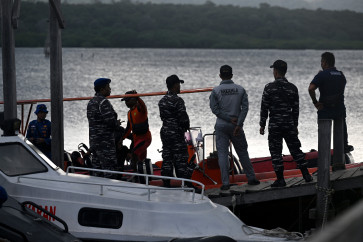Popular Reads
Top Results
Can't find what you're looking for?
View all search resultsPopular Reads
Top Results
Can't find what you're looking for?
View all search resultsTanjung Priok case: Victims tell their stories
"They used the water from the fire station to wash the blood from the streets," 49 year-old Saiful Hadi said as he gazed at the fire station building in Tanjung Priok, North Jakarta, 25 years after the bloody event took place
Change text size
Gift Premium Articles
to Anyone
"They used the water from the fire station to wash the blood from the streets," 49 year-old Saiful Hadi said as he gazed at the fire station building in Tanjung Priok, North Jakarta, 25 years after the bloody event took place.
Saiful was a victim of the 1984 Tanjung Priok clash between the military and Islamic activists. The death toll has not been clearly established until today, but some residents claimed there were as many as 400 people either killed or missing.
Over 20 years on, some of the tragedy's victims, including Saiful, are still seeking justice, after a legal battle started when an Ad Hoc Human Rights court convened in 2003 acquitted all the military personnel that were accused of being involved in the incident.
As he re-traced the incident on the night of Sept. 12, Saiful described to The Jakarta Post what it was like to be among the hundreds marching on the street to demand justice before coming under a hail of bullets.
"That was where the army stopped us," he said, gesturing at a spot near the North Jakarta Police headquarters and close to the fire station.
Some parts of the neighborhood have not changed much since that day, Saiful said.
"That was where the prayer meeting was held before the march," he said, as he passed a crowded intersection a few hundred meters from the fire station.
The march was held to demand the release of four local religious figures held by the military for allegedly being responsible for the burning of a motorcycle owned by a member of the Babinsa - an abbreviation used for soldiers assigned to subdistrict or village level.
A woman walks in front of Musholla As- Sa’adah in North Jakarta on Saturday. JP/Nurhayati
The motorcycle incident was preceded by a minor brawl between Babinsa members who went into the local Mushalla As-Sa'adah, a small place of worship in the neighborhood.
The army men reportedly went inside the mushalla without taking off their shoes and ripped up pamphlets protesting against Soeharto's imposition of the Pancasila ideology on all mass organizations.
"Back then, [the house of prayer in] Tanjung Priok offered freedom of speech for those opposing the [imposed] single ideology. Many young people flocked there to hear sermons that were critical of the government," Saiful, who then led a group from his neighborhood in Cempaka Putih, Central Jakarta, to hear the sermon, said.
According to him, the streets leading to the police headquarters were flooded by protesters that night.
"Of course, the streets were narrower back then with only two lanes, but still the number of protesters was massive," he said of the four-lane street near the police headquarters.
What followed when the army stopped the march, Saiful said, was a shooting incident where some of those in the front line of the march were killed.
"I was lucky because I was in the back," Saiful said.
He tried to escape without success. The military apprehended him later in his residence.
Marullah, another victim, recalled how gory the scene was.
"I can't even remember where I went to at that time. I just followed along and then it *the shooting* happened. I even tried to help drag bodies to the mosque," he said.
Marullah , who was only 15 then, tried to escape, but like Saiful, his effort was in vain.
"They caught me in the Semper area. The neighborhoods were surrounded by the military," he said.
Saiful and Marullah say they were then subjected to violence from the soldiers for months *during detention*.
"They kicked us and hit our heads with rifles. My body cannot function well now," Marullah said, as he showed a deep scar on his foot.
For some, the treatment was said to have caused deep mental scars.
"One of my friends has gone mad and now wanders on the streets, he was only 13 then," Marullah said.
Husein, another victim who was carrying a flag on the frontline that night, was wounded.
"I was not arrested because I owned a shop in the area and I said it was normal for me to be there," he said smiling, as he showed a bullet mark on his foot.
The three victims claimed that their lives were in jeopardy after the tragedy.
"I couldn't go to school *after being released*. The teacher told me to move to another town," Marullah said.
Saiful and Husein found it hard to get a job or run businesses, because society marked them as rebels.
In 2001, Gen. (ret) Try Sutrisno proposed a reconciliation called islah to the victims; some accepted the offer but others disagreed because those accepting islah then refused to testify for the investigation. In September 2001, Try and the proponents of islah asked the then Chief Justice MA Rahman not to disclose the names of those (soldiers) accused of crimes.
One of the proponents of islah was Ahmad Sahi, who was in the neighborhood for the preparation of the 25th commemoration of the tragedy.
Sahi, who still runs religious activities in the neighborhood, was one of the four arrested religious figures following the motorcycle burning.
Saiful and Sahi then broke fast together and reminisced about the Tanjung Priok days.
"We chose islah because we didn't want to prolong the conflict," Sahi said.
However, he said he was disappointed on how the scheme turned out, after spending years helping to maintain Yayasan 12 September, the (non-profit) foundation established by the pro-islah group.
"The state is yet to give compensation to the victims. But it seems that they have forgotten that," Sahi said. (dis)










